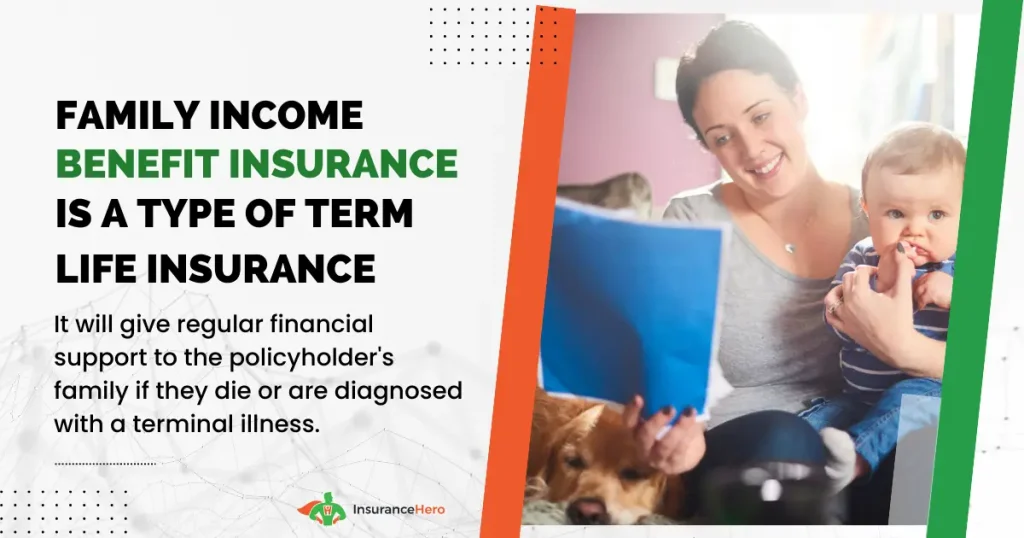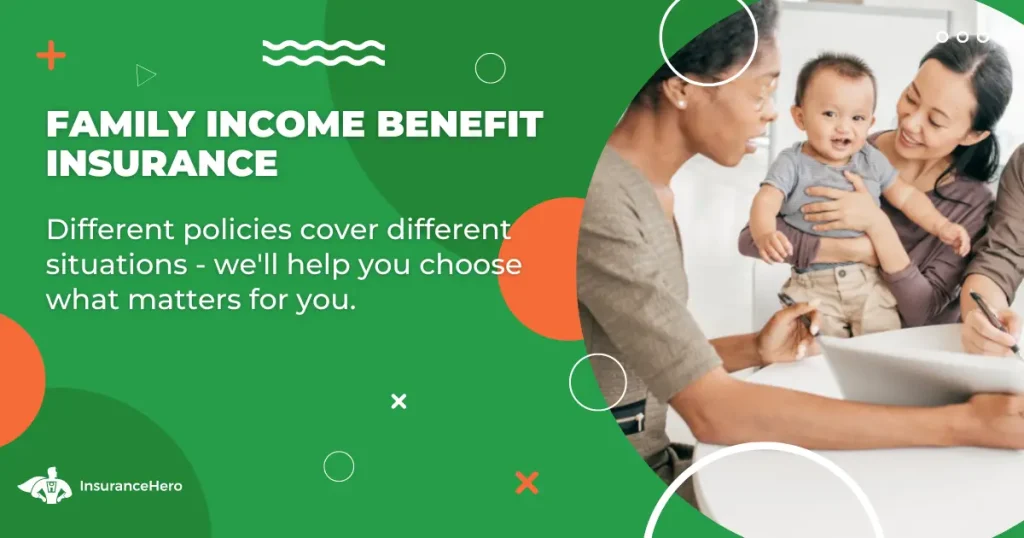Family Income Benefit Insurance Guide

Family income benefit insurance is a type of decreasing term life cover with one pertinent difference.
It doesn’t pay out a lump sum in the event of the policyholder’s death. Instead, it pays out a fixed income for the duration of the policy.
That means you can take out a Family Income Benefit Policy for the amount you specify, such as the salary of the main earner in the household, for example, to pay £2,000 per month.
This will not be indefinite if a claim is made, as the payments from the insurer will stop when your policy term expires.
The term durations can be anything from 20 to 25 years, and whenever your cover expires, the payments from your insurer stop.
In layman’s terms, if you took out cover today on a 20-year term policy and then had to claim one year into it, the policy would pay the monthly agreed amount to the beneficiary for the remaining 19 years that would be left to run on the term of the policy.
Protect Your Loved Ones And Get Peace Of Mind With Family Life Insurance Today


If, however, you took the same policy out and the named beneficiary didn’t need to claim it until 19 years into the policy, the payments made by the insurer would only continue for the remaining year of the policy. That’s why it’s classed as a decreasing term policy.
Is a Family Income Policy Suitable for Your Family’s Financial Protection?
In the case of paying off secured finance, it’s often not the case. Larger debts are best protected using a level-term policy, meaning it would pay out a fixed lump sum, regardless of the claim, other than any clauses in the policy.
A suitable situation for a family income benefit policy could be to cover your family’s living expenses.
It may be that you would want to know if they’d continue to have your wages coming into the household until at least your children were through college or university.
Or, if you have care costs, you have to factor them into your current outgoings to ensure they will continue to be covered for a set period of time. A family income benefit is income protection, more than it is life insurance.
Adding Extra for Affordable and Better Insurance Cover is Possible
As with most insurance policies, there’s usually the option to add on a level of critical illness cover. This can be added to a Family Income Benefit policy as well.
As this type of cover is decreasing, it is among the most affordable levels of cover you can buy. The lower cost of premiums can be cheaper than a level-term policy.
It will still pay out if the policyholder is diagnosed with a terminal illness, even if you add critical illness cover to your plan.
The more levels of cover you add to this, though, the higher the cost will become, sometimes to the point that when you finally reach an agreed level of cover that you need in place, the premiums can work out more expensive than if you were to opt for level-term cover, with the same added extras.
Some insurers will provide additional levels of cover inclusively as added extras to select packages.
Another option you’ll have available is a Waiver of Premium. With that added on, you insure your monthly premiums, so you know those would continue to be paid by the insurer for the remainder of the policy if you were to be diagnosed with a critical illness or a long-term illness that makes you unable to work.
Joint policies for dual-income households
In dual-income households, it makes perfect sense in most cases to consider joint policies, as it usually works out cheaper because the policy ends on the death of one person.
The survivor will receive the amount of benefits remaining under the cover. However, it should be remembered that the premiums will only cover the income you agreed to when you took the policy out.
There wouldn’t be any large lump sum payments made. Just the monthly income for however long the policy is left.
All your existing financial obligations must still be maintained using the policy income. As they can be arranged on terms as long as 20+ years, always consider the cost of inflation.
What you pay just now for any carers, home help, or child care, will rise in the future. As well as the cost of energy bills, home repairs, and most of the living expenses.
A couple of ways you can build a buffer to cover for inflation are to:
- 1) Add a percentage to the amount of cover you want to keep coming in, such as 5% to 10% above the salary you’re protecting.
- 2) Choose a policy that pays out more each year. Both would bump up your premiums, but how much is what you would need to find out at the quotation stage before applying.
For the most part, a Family Income Benefit Policy is an affordable insurance cover. Still, as it’s a decreasing term policy and doesn’t include any lump sums, it’s not suitable for everyone. Nor is it a level of cover widely available, as it’s considered specialised protection.
The basic level of cover will provide beneficiaries with an income upon the policyholder’s death. That will only be until the policy expires, at which point the payments will cease.
A 20-year term FIB policy will not pay an income for 20 years. It’s 20 years from the original date detailed on your policy.
When that expires, the income that would have been paid to the named beneficiary will stop being paid.
The Benefits of Family Protection Products
In the UK, there are a few different life insurance policies that offer benefits to families. One option is family life insurance, which pays out a lump sum to your family when you die.
This can cover funeral costs, pay off debts, or help with everyday expenses.
Another option is income protection insurance, which pays a regular income to your family if you cannot work due to illness or injury. This can help cover bills and other household expenses.
Both of these policies can be helpful for mums and families living in the UK. They provide peace of mind that your loved ones will be taken care of financially if something happens to you.
Steve Case is a seasoned professional in the UK financial services and insurance industry, with over twenty years of experience. At Insurance Hero, Steve is known for his ability to simplify complex insurance topics, making them accessible to a broad audience. His focus on clear, practical advice and customer service excellence has established him as a respected leader in the field.


